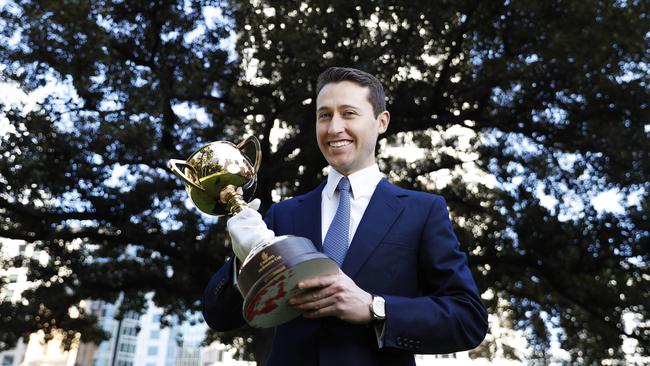Tom Waterhouse on a winner with tips
Once the hated public face of bookmaking, Tom Waterhouse believes he’s back on a winner.

He was once the public face of the bookmaking industry and hated for it, but Tom Waterhouse says he is now revelling in his relative anonymity.
Waterhouse is back in business a little over a year after leaving behind a career as a bookie following the sale of the Australian arm of William Hill, which he had taken the helm of in an ill-fated $700 million move that saw the global giant chop TomWaterhouse.com and two other existing betting brands and replace them with its own name.
He has his eponymous brand under his control again, running TomWaterhouse.com as a racing tipping service and trying to help punters beat the bookies.
Yet there are no big advertising campaigns and Waterhouse doesn’t have his face plastered on buses and trams. A little over 12 months into a two-year non-compete agreement with the buyers of William Hill, The Stars Group, Waterhouse says he is enjoying a quieter time.
Thought there’s plenty of scuttlebutt in the gambling industry that he’ll be back as a bookie next year, Waterhouse insists he’s left that life behind. “No, I don’t think so,” he says when asked if he’s contemplating a comeback. “You never say never, but I like being on the other side.”
It’s quite a change from the days when his name was on TV and he even had a controversial if short stint as part of the Channel 9 panel during live NRL broadcasts.
The pioneer of the integration of betting odds on TV during sport and racing broadcasts and a tireless self-promoter laughs when he’s asked to recall the days of being one of the most polarising identities on the media and sporting landscape.
“Controversy allows you to grow quickly. There was so much free publicity and it became a topic of conversation at the water cooler — people saying what about that annoying guy on the TV or what an arrogant schmuck.
“All these sorts of things were so positive for growth. Which other brand do you know of … that has gone from 100 customers to 250,000 in 18 months?”
This time around, though, as horse racing’s Spring Carnival in Victoria begins on Saturday with Memsie Stakes Day at Caulfield building to November’s Melbourne Cup and The Everest in Sydney the month before, Waterhouse wants the punters to win big time. “The journey of TomWaterhouse.com this time is definitely not the same (customer) acquisition story. But it’s a better story in other ways.
“Before, we were offering a similar betting product to what was out there with an individual’s name attached to it, whereas here I don’t know of any other product in the world that offers what we offer. Everyone offers tipping services, but I’ve never heard of anyone offering ‘how to win as a punter’. There’s no one who has gone ‘this is how you have to think about betting’.”
Waterhouse’s members pay subscription fees depending on the level of information they want. Basic tips can be free, all the way up to platinum packages costing hundreds of thousands of dollars and including granular betting information, trips to UK and European racing and other events.
While he won’t say how many members have signed up, Waterhouse claims they are winning.
In a little over a year, he says his members have made double-digit profits on turnover. His silver package, including five best bets every Saturday and a staking plan each race, has returned 19.4 per cent since inception, while a gold package of 20 best tips is up 19.5 per cent.
His point of differentiation, he says, is breaking the science of betting into three distinct areas and then ensuring his members have the discipline to follow his rules strictly: working out which horse to back, how much money to stake and then getting the bet on at the best possible price with bookmakers.
“How the winning punters work out the selection is they get a large amount of data and they crunch that data through a regression model, or any statistical model, to work out what they think is the true probability. And when they see the market is not priced according to their true probability, either overs or unders, they back accordingly.” Waterhouse says the next factor is working out how much to have on the selection. If he is confident he says bet more, if it’s not as good value then less, and so on.
“The third thing is you have to make sure you always get the top price. Bookies bet on 1000 events a day … and there is occasion when they misprice the market and when they misprice you have to make sure you get the maximum return off that.
“If you follow those three rules, getting the right selection, the staking and getting on at the right price you become very hard to beat. But most people don’t know this.
“It is why there’s only a dozen or so [syndicates] there winning because most people don’t have the discipline to follow these three rules strictly.”
Getting the right price was also a big factor in the end of Waterhouse’s bookmaking career, for now at least, in April last year.
William Hill’s $300m sale capped an almost four-year period for Waterhouse at the helm of its Australian business, which had come after he had sold the London-listed wagering company in a $40m cash and share deal as part of a $700m spending spree that also saw it buy Centrebet and Sportingbet.
Waterhouse becoming the CEO was surprising enough. The son of legendary bookie Robbie and horse trainer Gai, Tom says his parent’s reaction was, “What, you want to take a job? That’s ridiculous. Why would you want to work for them? Work for yourself. I don’t think anyone in the family has worked for anyone else for generations.
“It was really good because I saw something different. William Hill were great people to deal with. But I don’t think I will go back to working for someone else.”
The problem, Waterhouse says, is it soon became apparent to William Hill globally that they had paid too much for the three businesses, along with the strategic mistake in dumping three established brands in the intensely competitive Australian market for the William Hill moniker that a focus group once told them sounded like a brand of cigarettes. It also faced a market in which Sportsbet, then owned by Paddy Power (now Flutter Entertainment), and the then CrownBet were spending huge amounts to win market share.
“I remember when we were at an analyst meeting and our global CEO said we are going to be bigger than Paddy Power in Australia, and an analyst said you’re spending half the marketing money and you’re half the size of them now, you’re in an 800m race and you’re 400m behind, how are you going to catch them with half the headcount and marketing, and a new brand? And that is a decent question.”
William Hill’s profits in Australia would fall 90 per cent during Waterhouse’s time in charge, despite him trying innovative ideas such as the controversial “click to call” internet voice call betting service during races (in-play online betting is banned) and sponsoring the Australian Open tennis.
The company decided to exit Australia and a bidding war saw Matthew Tripp execute a deal that saw The Stars Group buy a majority stake in CrownBet and then buy William Hill Australia and Waterhouse gain his brand back.
He says he then wrote 20 ideas up on a whiteboard of what he could do with TomWaterhouse.com, ranging from foreign exchange trading and a betting affiliate business to an odds comparison site. The tipping service won out.
Waterhouse says he will eventually expand the business into Hong Kong, where racing is popular and on which he has already started offering some bet tips, and then racing in Japan and potentially other markets like the US and sports.
He also senses an opportunity to start a fund that would invest in gambling stocks around the world, at least offer investment advice on various shares in the sector. “From an analytics and data point of view, I can’t see why the same principles don’t apply to other areas I know.
“Now I’ve got the brand back, I don’t see it as a three or five or 10 year play. It is a 20 or 30 year play. As long as it’s keeping to that core principle of value then the members are sticky and you can build out those verticals over time. There will be a desire for them. People want to win and make money.”




To join the conversation, please log in. Don't have an account? Register
Join the conversation, you are commenting as Logout